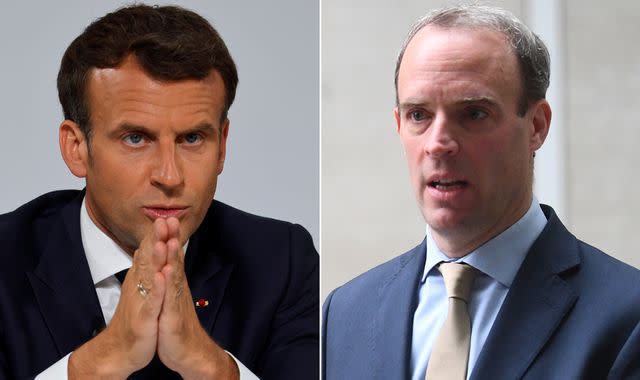Brexit: Raab says 'ball is very much in the EU's court' after Macron raises heat in Northern Ireland protocol row
Dominic Raab has said "the ball is very much in the EU's court" with regards to the implementation of the Northern Ireland Protocol , as French president Emmanuel Macron has warned Britain that the Brexit deal is not renegotiable.
The foreign secretary told Sky News the EU must be "less purist, more pragmatic and more flexible" on the matter, adding that the bloc's approach "is the risk to the Good Friday Agreement".
Boris Johnson and US President Joe Biden "didn't linger" on Brexit issues when meeting in person for the first time on Thursday and it was the prime minister who raised the matter, Mr Raab also noted.
"The prime minister and the president did touch on the Northern Ireland Protocol and we understand the US interest in it as a longstanding guarantor of the Good Friday Agreement," he said.
Mr Raab said the prime minister was able to explain that "we want a flexible, pragmatic approach".
"But for that to happen the EU must be less purist, more pragmatic and more flexible in the implementation of it," said the foreign secretary.
"The ball is very much in the EU's court in relation to that.
"Frankly, the prime minister and the president didn't linger on it, there were so many other things that were discussed."
He continued: "There was a respectful conversation. The prime minister wanted to raise it and be very clear on our position.
"It is the dogmatic, purist approach that the EU has taken which is the risk to the Good Friday Agreement."
The foreign secretary's comments came as French President Emmanuel Macron told a news conference that "nothing is renegotiable, everything must be applied" as he prepared to travel to the UK for the G7 summit in Carbis Bay, Cornwall.
The protocol effectively keeps Northern Ireland in the European single market for goods in order to avoid a hard border with Ireland, meaning a trade barrier in the Irish Sea for goods crossing from Great Britain.
But Britain's exit from the EU has strained the peace in Northern Ireland.
The 27-nation bloc wants to protect its markets but a border in the Irish Sea cuts off the British province from the rest of the United Kingdom.
Although Britain formally left the EU in 2020, the two sides are still trading threats over the Brexit deal after London unilaterally delayed the implementation of the Northern Irish clauses of the deal.
Mr Macron told reporters: "I think this is not serious - to want to have another look at something in July that was finalised in December after years of discussions and work."
"We have a protocol," he continued. "If after six months you say we cannot respect what was negotiated, then that says nothing can be respected. I believe in the weight of a treaty, I believe in taking a serious approach. Nothing is negotiable. Everything is applicable."
Following his first talks at the summit with Mr Biden, Mr Johnson played down differences with Washington over the impact of Brexit on the peace in Northern Ireland.
The prime minister hailed Mr Biden as "a big breath of fresh air" because he wanted to work with London on a huge range of issues ranging from climate change and COVID to security.
Mr Johnson said the United States, United Kingdom and European Union had "complete harmony" on finding solutions to uphold the 1998 peace deal.
Former prime minister Tony Blair said "there was always going to be" a problem with the protocol and called for "practical solutions" to be found.
"At one level, it is an irresolvable problem and I think the only way they are going to resolve it is to get down to sort of brass tax on the practical issues and see where Northern Ireland could in any event keep align with European regulation and where there maybe areas where it really doesn't matter so much for Britain also to be in line with European regulation in order to make that border," he told Sky News.
Asked whether he agreed with Mr Raab's comment that the EU need to be "more pragmatic", Mr Blair added: "The EU would put it the other way around by the way.
"There is no point in going into a negotiation sort of by megaphone with the other side, you have got to sit down and try and work it out.
"But I think there will be huge resistance in Europe to scrapping the protocol because it is not as if the protocol was negotiated without there being a clear understanding of what it meant
"Now, as I say, I don't think there is any way you are going to get the protocol scrapped. I think what could happen is that you find, as I say, these practical ways through - and let's hope that that happens, otherwise it will cause real tension in Northern Ireland."

 Yahoo News
Yahoo News 

